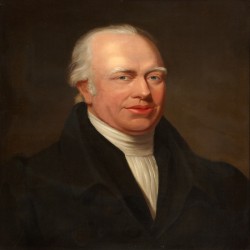
Adam Clarke
| Date of Birth | : | 26 Jun, 1762 |
| Date of Death | : | 26 Aug, 1832 |
| Place of Birth | : | Moybeg Kirley |
| Profession | : | Theologian |
| Nationality | : | British |
Adam Clarke was a British Methodist theologian who served three times as President of the Wesleyan Methodist Conference (1806–07, 1814–15 and 1822–23). A biblical scholar, he published an influential Bible commentary among other works. He was a Wesleyan.
Early life and Education
Clarke was born in 1760 or 1762, in the townland of Moybeg Kirley near Tobermore in County Londonderry. His father, an Anglican, was a village schoolmaster and farmer; his mother was a Presbyterian. His childhood consisted of a series of life-threatening mishaps. After receiving a very limited education he was apprenticed to a linen manufacturer, but, finding the employment uncongenial, he resumed school-life at the institution founded by Wesley at Kingswood.
In 1778, at the age of fourteen, Rev. John Wesley invited him to become a pupil in the Methodist seminary lately established at Kingswood, Bristol. In 1779, he converted to Methodism after listening to a preacher.
Career
In 1782, at nineteen he became an itinerant preacher, appointed to the circuit of Bradford, Wiltshire, until 1805. He afterwards resided chiefly in London, and devoted much of his time to literary research.
While second to none in the labours of the ministry, Clarke was a most assiduous scholar. First the classics engaged his especial attention, then the early Christian fathers, and then Oriental writers; Hebrew, Syriac, Arabic, Persian, Sanskrit, and other Eastern tongues, with the literature which they represented, being among the subjects of his study. Natural science was a favourite subject, and he had an interest in what are called the occult sciences. He contributed to the Eclectic Review from the date of its establishment in 1804, and rendered much literary assistance to the British and Foreign Bible Society.
In 1807 he received the diploma of M.A. from the university and King's College, Aberdeen. In 1808 the University of Aberdeen conferred on Clarke the honorary degree of LL.D., the university highest academic honour. In 1815, Clarke removed and resided in an estate in Millbrook, for several years. In 1823, Clarke removed to London and afterwards to Haydon Hall, where he resided until his death.
Death
Clarke died from an attack of cholera on 26 August 1832. There is a memorial to Adam Clarke in Portrush, Antrim, County Antrim.
Quotes
Prayer requires more of the heart than of the tongue.
Prayer is not designed to inform God, but to give man a sight of his misery; to humble man's heart, to excite his desire, to inflame his faith, to animate his hope, to raise his soul from earth to heaven.
If you go forward in the spirit of the original apostles and followers of Jesus Christ, trusting not in man but in the living God, he will enable you to pull down the strong holds of sin and Satan, and that work by which he is pleased will prosper in your hands.
Many talk much, and indeed well, of what Christ has done for us: but how little is spoken of what he is to do in us! and yet all that he has done for us is in reference to what he is to do in us.
Now it would be as absurd to deny the existence of God, because we cannot see him, as it would be to deny the existence of the air or wind, because we cannot see it.
Woe to that man who runs when God has not sent him; and woe to him who refuses to run, or who ceases to run, when God has sent him.
They who pray not, know nothing of God, and know nothing of the state of their own souls.
The same sun that hardens the clay softens the wax.
The grand obstacle to the salvation of the scribes and Pharisees was their pride, vanity and self-love. They lived on each other's praise. If they had acknowledged Christ as the only good teacher, they must have given up the good opinion of the multitude; and they chose rather to lose their souls than to forfeit their reputation among men!
To be filled with God, is a great thing; to be filled with the fulness of God, is still greater; to be filled with all the fulness of God, is greatest of all.
